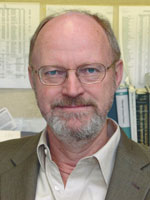 BS, Chemistry, University of Florida, Gainesville, Florida, 1963; MS, Merle Battiste, 1965. PhD, Ronald Breslow, Chemistry, Columbia University, New York, New York, 1968. NIH Postdoctoral Fellow, James P. Collman, Chemistry, Stanford University, 1968-69.
BS, Chemistry, University of Florida, Gainesville, Florida, 1963; MS, Merle Battiste, 1965. PhD, Ronald Breslow, Chemistry, Columbia University, New York, New York, 1968. NIH Postdoctoral Fellow, James P. Collman, Chemistry, Stanford University, 1968-69.
Dr. Robert H. Grubbs is currently the Victor and Elizabeth Atkins Professor of Chemistry at the California Institute of Technology, Pasadena, California, USA, where he has been a faculty member since 1978. Before moving to Caltech, he was at Michigan State University from 1969 to 1978 achieving the rank of Associate Professor.
The research group of Grubbs is involved in the design, synthesis, and mechanistic studies of complexes that catalyze basic organic transformations. The major focus of the group over the past few years has been on the olefin metathesis reaction. To optimize the utility of this reaction, new catalysts have been developed that are extremely tolerant of organic functional groups. Due to their high-activity, functional group tolerance, and ease of use, these ruthenium based catalysts have found wide applications in organic and polymer synthesis. He has more than 490 publications and 105 patents.
Professor Grubbs awards have included Alfred P. Sloan Fellow (1974-76), Camille and Henry Dreyfus Teacher-Scholar Award (1975-78), Alexander von Humboldt Fellowship (1975), ACS National Award in Organometallic Chemistry (1988), Arthur C. Cope Scholar Award (1990), ACS Award in Polymer Chemistry (1995), Nagoya Medal of Organic Chemistry (1997), Fluka Reagent of the Year (1998), Mack Memorial Award (1999), Benjamin Franklin Medal in Chemistry (2000), ACS Herman F. Mark Polymer Chemistry Award (2000), ACS Herbert C. Brown Award for Creative Research in Synthetic Methods (2001), ACS Arthur C. Cope Award (2002), ACS Award for Creative Research in Homogeneous or Heterogeneous Catalysis (2003), Richard C. Tolman Medal (Southern California Section ACS - 2003), ACS Tetrahedron Prize for Creativity in Organic Chemistry (2003), Pauling Award Medal (2003), Bristol-Myers Squibb Distinguished Achievement Award in Organic Synthesis (2004), Kirkwood Medal (2005) (New Haven Section, ACS), Paul Karrer Gold Medallion (2005) (University of Zurich), August-wilhelm-von-Hofmann-Denkmunze (2005) (German Chemical Society), Nobel Prize in Chemistry (2005), Havinga Medal (2006) (Leiden University), Golden Plate Award (2006) (Academy of Achievement), and Tetrahedron Most Cited Paper 2003-2006 Award (“Olefin Metathesis”), Tetrahedron Letters Most Cited Paper 2005-2008 Award (“A Neutral, Water-Soluble Olefin Metathesis Catalyst Based on an N-Heterocyclic Carbene Ligand”), ACS Award for Creative Invention (2009). He was elected to the National Academy of Sciences (1989), Fellow of the American Academy of Arts and Sciences (1994), the Honorary Fellowship of the Royal Society of Chemistry (2006), Fellows of the American Chemical Society (2009).